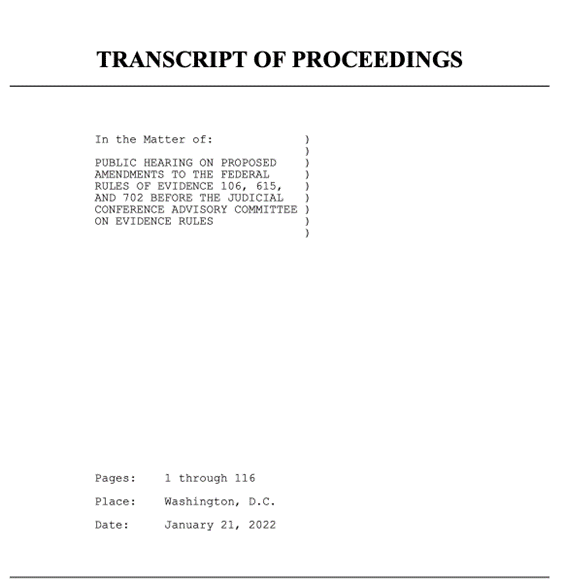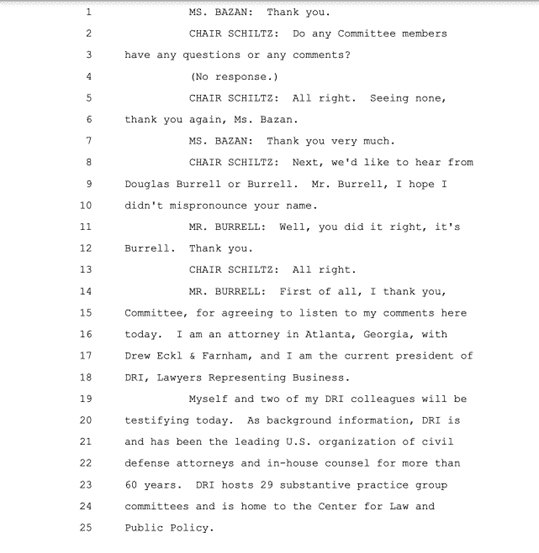Are you using the most cost-effective court transcription methods possible? Here are some tips for cutting costs while still maintaining high standards.
When it comes to statements made in a court of law, accuracy is the name of the game. Every word matters—which is why having an accurate court transcription is so essential. In this guide to court transcripts, we’ll cover everything you need to know about these documents, including the uses of court transcripts, the benefits they provide, and our top cost-saving tips.
What is a court transcription?
Court transcripts are written records of court proceedings, including all the words spoken during legal proceedings in front of a judge. They provide an officially documented account of what happened in court and allow attorneys to review and analyze evidence with greater ease.
How do you obtain a court transcript?
Many court proceedings have a stenographer or court reporter transcribing the legal proceedings live. You can then request a legal transcription of that proceeding from the court. However, ordering court transcripts straight from the court can be pricey, as you typically have to pay by the page. Considering one minute of testimony typically yields about one page of transcript, you’re looking at a hefty bill if you go this route.
Additionally, they take a long time to deliver—sometimes 30 days or more. So if a defendant wants to appeal a verdict based on a procedural error, they may go to a private party to have the transcript done instead.
Luckily, most courts have audio recordings of proceedings that you can order as an audio file. Once you have the audio, you can have it professionally transcribed. Court transcription companies are typically faster and more cost-effective than ordering transcripts straight from the court.
Court reporters vs legal transcriptionists: what's the difference?
Court reporters or stenographers are certified and trained on specific court reporting procedures, which have unique requirements. For example, they record hand motions and sounds like scoffs or laughing. In addition, court reporters help provide accurate, real-time recordings of what happened during the trial using stenography machines.
On the other hand, legal transcriptionists provide transcripts of dictated legal documents (contracts, pleadings, correspondence) in addition to court proceedings. While it’s true that legal transcriptionists don’t complete the same comprehensive education as a court reporter, one study found that legal transcriptionists make fewer errors than court reporters.
What are the benefits of obtaining a court transcription?
Having a legal transcription of court proceedings is beneficial for many reasons, but here are some of the biggest benefits of getting your hands on a court transcription.
You can easily find important information.
Having a transcript makes it easier for attorneys, judges, and other legal professionals to quickly find relevant information for their cases. With a digital court transcription at your fingertips, you can search for keywords and phrases to quickly find the information you need using keyboard shortcuts.
You have official clarity around courtroom testimony and events.
Accuracy is vital when it comes to courtroom testimony and events, as it can make all the difference in a case. Digital court transcriptionists provide precision and clarity around what happened during courtroom proceedings, enabling legal professionals to review the evidence without worrying about errors or misinterpretations.
Share with family members and stakeholders who can’t be physically present.
Occasionally, family members, stakeholders, or other interested parties can’t make it to court proceedings. With a court transcription, they’ll be able to stay in the loop and access the same transcripts that everyone else is using.
What tools and services can help transcribe court proceedings efficiently?
Once you obtain a copy of the audio/video from a court proceeding, a few different tools and services are available to help you transcribe the proceedings efficiently and affordably.
Fastest transcription – A.I. transcription services
AI-assisted transcription services or speech-to-text technology can help you quickly and accurately transcribe court proceedings. These services use artificial intelligence algorithms to identify words, phrases, and speakers within an audio or video file. They then output a transcript of the proceedings in a matter of minutes.
While it may be the fastest method, it’s not the most accurate one. A.I. transcription is only up to 90% accurate, leaving room for errors and omissions that could wind up costing your case big time. Set aside time for editing and proofreading if you choose this method.
Most accurate transcription – Human transcription services
Human court transcription services are the most accurate and reliable way to transcribe court proceedings. Professional transcribers have the knowledge, experience, and expertise to capture every detail of courtroom testimony, debates, objections, and other proceedings. With human transcription services, you can be confident that your transcript is accurate beyond a shadow of a doubt.
What to look for when selecting court transcription services and software
When selecting court transcription services and software, there are a few key features that you should look for:
Accuracy is essential.
Accurate transcripts are essential for any court proceedings. Make sure you select a service or software that guarantees accuracy and offers proofreading services to ensure there are no errors or omissions in the transcript.
Services should be affordable.
The cost of court transcriptions can be pricey, so make sure to factor affordability into your decision. Look for services and software with competitive pricing and flexible payment options.
Turnaround time should be speedy.
Depending on the urgency of your case, turnaround time can be a deciding factor when choosing court transcription services. Therefore, ensure that the service you select offers quick turnaround times and can meet your deadlines.
Customer support should be available at any time.
Customer support should be available to help you troubleshoot any issues with the service or software. Make sure that the court transcription services you select offer 24/7 technical support in case you encounter any problems.
Examples of high-quality court transcriptions
When it comes to high-quality court transcriptions, regulations for formatting may vary from state to state. That being said, your transcribed document should look similar to this:


In this professional court transcription example, you can see that the transcriptionist considered everything from formatting to accurately labeling speakers. In addition, the transcriptionist documented what was said with precision, allowing legal professionals to review and evaluate the evidence quickly.
FAQs
What is the most accurate method for court transcription?
Human transcription services are considered the most accurate method for court transcriptions. Professional transcribers have the knowledge, experience, and expertise to capture every detail of courtroom testimony and proceedings.
Whose responsibility is it to transcribe court proceedings?
The court reporter or stenographer typically has the responsibility of transcribing court proceedings. However, buying these from the court is pricey. Most courts capture some kind of audio or visual documentation, giving you the freedom to have your own affordable transcription created.
What tools can you use for court transcription?
To transcribe court proceedings, you’ll need a copy of the audio/video from the court proceeding and a tool or service to help you with the transcription process. While you could try to transcribe the testimony yourself to save money, you will pay with time if you choose this route.
AI-assisted transcription services or speech-to-text technology can help you quickly and accurately transcribe court proceedings, but these services are only up to 90% accurate. Human court transcription services are the most reliable way to ensure accuracy in your transcripts.
What are trial transcripts used for?
Trial transcripts serve as a written record of court proceedings and can be used for legal purposes or to provide evidence in a case. They are essential for any court proceeding, so it’s important to make sure they are accurate and complete.
How long does it take to transcribe court proceedings?
The amount of time it takes to transcribe court proceedings depends on the length of the audio/video file and the accuracy rate of your court transcription service. For example, AI-assisted transcription services can typically transcribe recordings in a matter of minutes. But human court transcription services can get it done more accurately, sometimes in 3 hours or less.
Save time and money with SpeakWrite’s professional legal transcription services.
Our legal transcription services offer an efficient, cost-effective, and accurate solution for affordable court transcriptions. Plus, you can get high-quality transcripts with turnaround times as low as three hours.
Our professional court transcribers are trained to capture every detail of courtroom proceedings with an accuracy rate of 99% or better. We offer competitive pricing starting at just 1.5 cents per word for single speaker audio. See how much time and money legal transcription services could save you and your company with our Time and Cost Savings Calculator.




